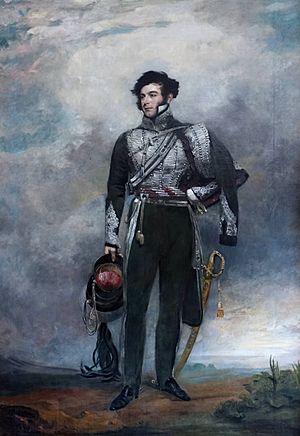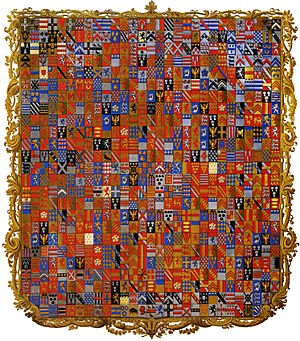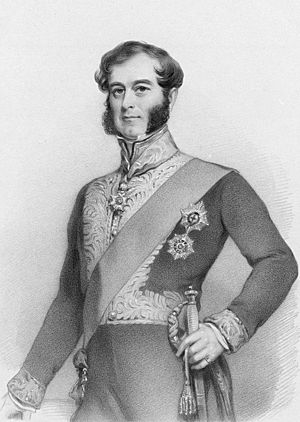Richard Temple-Nugent-Brydges-Chandos-Grenville, 2nd Duke of Buckingham and Chandos facts for kids
Quick facts for kids
The Duke of Buckingham and Chandos
|
|
|---|---|

The Duke of Buckingham and Chandos by John Jackson.
|
|
| Lord Privy Seal | |
| In office 3 September 1841 – 2 February 1842 |
|
| Monarch | Queen Victoria |
| Prime Minister | Sir Robert Peel |
| Preceded by | The Earl of Clarendon |
| Succeeded by | The Duke of Buccleuch |
| Personal details | |
| Born | 11 February 1797 Stowe House, Buckinghamshire |
| Died | July 29, 1861 (aged 64) Great Western Hotel, Paddington, London |
| Nationality | British |
| Political party | Tory |
| Spouse |
Lady Mary Campbell
(m. 1819; div. 1850) |
| Children |
|
| Parents |
|
| Alma mater | Oriel College, Oxford |
Richard Plantagenet Temple-Nugent-Brydges-Chandos-Grenville, 2nd Duke of Buckingham and Chandos (born 11 February 1797 – died 29 July 1861) was an important British politician. He was a member of the Tory party. He held the title of Viscount Cobham when he was born. Later, he became the Earl Temple and then the Marquess of Chandos. From 1841 to 1842, he served as the Lord Privy Seal, a high-ranking government position.
Two things made his life stand out, especially for someone of his high social standing. First, he got a divorce, which was very rare and difficult back then. It even needed a special law passed by Parliament. Second, even though he was born into great wealth, he went bankrupt in 1847. He owed over a million pounds, which was a huge amount of money at the time.
Contents
Early Life and Education
Richard was born at Stowe House in Buckinghamshire. His father was the 1st Duke of Buckingham and Chandos. His mother was Lady Anne Brydges. She was the only child of the 3rd Duke of Chandos.
In 1799, his family changed their name to Temple-Nugent-Brydges-Chandos-Grenville. This was done to include his mother's family name. Richard was the grandson of the 1st Marquess of Buckingham. He was also the great-grandson of Prime Minister George Grenville. He went to school at Eton College and later studied at Oriel College, Oxford.
Political Career and Honors
Richard became a Member of Parliament for Buckinghamshire in 1818. He served in this role until 1839. That year, he became the Duke of Buckingham and Chandos after his father passed away. This meant he joined the House of Lords.
In September 1841, he was made a member of the Privy Council. He was also appointed Lord Privy Seal by Sir Robert Peel. He held this important job for only a few months, until February 1842. He received several honors during his life. In 1835, he was made a Knight Grand Cross of the Royal Hanoverian Order. He became a Fellow of the Society of Antiquaries of London in 1840. In 1842, he was made a Knight of the Garter.
Historical Context of Slavery Compensation
During this time in history, some wealthy families in Britain owned plantations with enslaved people in other parts of the world. When slavery was abolished in 1833, the British government paid compensation to slave owners.
The 2nd Duke of Buckingham and Chandos received money from this compensation. This payment was for 379 enslaved people on the Hope Estate in Jamaica. The money was given to trustees for his benefit. This shows how some wealthy families in Britain were connected to the system of slavery.
Financial Challenges
In 1847, just eight years after becoming Duke, Richard faced serious money problems. He was declared bankrupt, meaning he could not pay his debts. He owed over a million pounds. This was a huge amount of money.
Because of his debts, he had to sell many of his family's properties. His Keynsham estate in Somerset was sold in 1841. Avington Park was sold in 1847. The most famous sale was in 1848. The contents of Stowe House, the main family home, were auctioned off. This was one of the biggest sales of its kind in the 1800s. It was a national sensation that such a rich aristocrat, who had inherited a large income, could lose so much.
Family Life
In 1819, Richard married Lady Mary Campbell. She was the daughter of the 4th Earl of Breadalbane. They had two children: a son named Richard, who became the 3rd Duke, and a daughter named Lady Anna.
Richard and Lady Mary divorced in 1850. At that time, getting a divorce was very difficult. It required a special Act of Parliament to be passed. Their daughter, Lady Anna, later became involved in campaigning for women's rights.
Richard died in July 1861 at the Great Western Hotel in Paddington, London. He was 64 years old. His only son inherited his title and became the 3rd Duke. His former wife, Lady Mary, died less than a year later in June 1862.
 | Selma Burke |
 | Pauline Powell Burns |
 | Frederick J. Brown |
 | Robert Blackburn |



